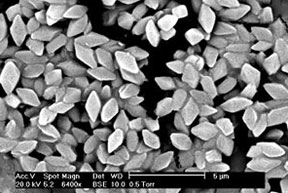BTI (BACILLUS THURINGIENSIS VAR. ISRAELENSIS)
Bacillus thuringiensis var. israelensis (5% WDP and AS) (Bti) is a type of soil bacterium that produces crystalline protein known as delta endotoxin. This protein is highly toxic to larvae of several aquatic insects, such as mosquitoes and black flies. Due to this unique insecticidal property, Bti endotoxin has an important place in the control of several human disease vectors in many parts of the world. Countries like United States of America have eradicated mosquitoes totally from their environment mainly because they adopted Bti long back in 1961. The Bill & Melinda Gates Foundation are great supporters of finding effective treatments for malaria, and ultimately eradicating the disease by 2015.Also Bti has now become compulsory in Singapore and also been recommended by the World’s biggest health organization, WHO, that has published an extensive study on Bacillus thuringiensis and is promoting Bti for safe drinking water.
Technology Transfer
Kilpest has procured the ‘Technology for mosquito larvicidal formulation of Bacillus thuringiensis israelensis’ developed at VCRC (Vector Control Research Centre, Puducherry) through NRDC (National Research Development Council, New Delhi). We posses the strain provided by VCRC Bacillus thuringiensis var israelensis Strain H-14 (B-17) which has been culminated into a wettable powder (WP, 5%) and aqueous suspension (AS, 5%) formulation.
Target Insects
Highly active against larvae of various mosquito species e.g. Aedes, Culex, Anopheles, Culisetta, Psorophora,Uranotaenia, Mansonia, vectors of malaria, filarial, Japnese encephalitis, dengue fever and larvae of black fly.
METHOD OF APPLICATION
Make homogeneous thick paste/suspension of the material in small quantitiy of water. Dilute with intermittent stirring. Spray@0.5gm/sqm water surface as 0.5% suspension by sprayer at 2-6 weeks interval.
Dossier: 5 lit./kg per hectare for clean water and 8-10 liter/kg for deep and polluted water
Biocontrol Mechanism
During the spore-forming stage of its life cycle, the Bti bacterium produces a protein crystal which is toxic only to mosquito and black fly larvae. These microscopic crystals are ingested by insect larvae when they are feeding. In the alkaline environment of the susceptible insect's digestive system, the crystals are dissolved and converted into toxic protein molecules that destroy the walls of the insect's stomach. The insect usually stops feeding within hours and dies.
Bacillus thuringiensis var. israelensis, (Bti) is extremely safe to mammals and non-target organisms and is classified as Class IV, low hazardous (green label) pesticide. It results in sharp and continuous decline of mosquito larvae population (90-100%) within 6-24 hrs of application in various habitats and ecological sites like drinking water tanks, coolers, fountains, swimming pools, construction sites, water streams, rice fields etc.
Technical Information
| Spore count | :1x1010 |
| Total Protein | :10% |
| Potency (ITU) Technical | :13,000 IU/mg |
| Potency (ITU) Forumulation | :5,500 IU/mg |
| Delta Endotoxin | :3.1%w/w |
| pH | :5 |
Composition
Composition
Bacillus thuringiensis
var israelensis spores : 5.8%w/w
Delta Endotoxin : 5.8% w/w
Nutrient medium residues : 30-35%
Sodium Chloride : 15-20%
Powdery Lignocellulose : 22-41%
Moisture : 4-7%
Shelf Life & Storage
Minimum 2-3 years if stored in dark well ventilated rooms in original packing at temperature not more than 40ºC.
Packing
WP : 50gms, 100gms, 1kg and 5kg.
AS : 50ml, 100ml and1lit.

Other Links
Products
Chemical
Biological
 Go to top
Go to top